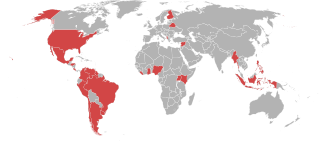 |
|---|
A constitutional referendum was held in the Bahamas on 7 June 2016. [1] Voters were asked whether they approve of four separate constitutional amendments. [1] All four proposals were rejected. [1]
 |
|---|
A constitutional referendum was held in the Bahamas on 7 June 2016. [1] Voters were asked whether they approve of four separate constitutional amendments. [1] All four proposals were rejected. [1]
Article 8 would have been amended from:
to:
Article 9 would have been deleted. It states:
Article 10 would have been amended from:
to:
Sections 1 and 3 of article 14 would have been amended from:
to:
Sections 3 and 4 of article 26 would have been amended from:
to:
In addition, a new section 11 would have been added:
| Question | For | Against | Invalid/ blank | Total | Registered voters | Turnout | ||||
|---|---|---|---|---|---|---|---|---|---|---|
| Votes | % | Votes | % | |||||||
| Articles 8 and 9 | 32,249 | 38.73 | 51,022 | 61.27 | 179,508 | |||||
| Article 10 | 24,148 | 28.79 | 59,714 | 71.21 | ||||||
| Article 14 | 28,246 | 33.98 | 54,890 | 66.02 | ||||||
| Article 26 | 17,919 | 21.43 | 65,696 | 78.57 | ||||||
| Source: Tribune242 | ||||||||||

Jus soli, commonly referred to as birthright citizenship, is the right to acquire nationality or citizenship by being born within the territory of a state.
Chapter 3: Citizenship. The third chapter of the 1997 Constitution of Fiji, comprising Sections 8 through 20 of the Constitution, set out the rules for citizenship in Fiji.
Omukama wa Bunyoro Translates to The King of Bunyoro is the title given to rulers of the East African kingdom of Bunyoro-Kitara. The kingdom lasted as an independent state from the 16th to the 19th century. The Omukama of Bunyoro remains an important figure in Ugandan politics, especially among the Banyoro people of whom he is the titular head. He is closely related to the Omukama of Toro Kingdom.

The British Nationality Act 1981 (c.61) is an Act of the Parliament of the United Kingdom concerning British nationality since 1 January 1983.
Freedom of movement, mobility rights, or the right to travel is a human rights concept encompassing the right of individuals to travel from place to place within the territory of a country, and to leave the country and return to it. The right includes not only visiting places, but changing the place where the individual resides or works.

Belonger status is a legal classification normally associated with British Overseas Territories. It refers to people who have close ties to a specific territory, normally by birth or ancestry. The requirements for belonger status, and the rights that it confers, vary from territory to territory.

Parliament of Sierra Leone is the legislative branch of the government of Sierra Leone. It is principally responsible for making laws. The Sierra Leone parliament consists of 149 members, of which 135 members are directly elected from across Sierra Leone's 16 districts, while 14 are paramount chiefs appointed from the 14 rural districts. The parliament is led by the Speaker of the House; the position is currently held by Abass Bundu of the Sierra Leone People's Party. The current elected 135 ordinary members of parliament are composed of members of the All People's Congress and the Sierra Leone People's Party which are the two largest political parties in Sierra Leone.

The Nationality law in Nepal are regulated primarily by 2015 Constitution of Nepal, Nepal Citizenship Act 2006 and Nepal Citizenship Regulations 2006. The Nepali Constitution regulates provisions for Nepali nationality in Part 2 from Article 10 to 15. The Nepal Citizenship Act 1964 was first promulgated on 28 February 1964 and provides for single citizenship for the entire country to inherit Nepali nationality. The Nepal Citizenship Act, 2006 was enacted on 26 November 2006. It repeals the 1964 Act and makes further provisions for the acquisition and termination of Nepali citizenship and related.
Status as a natural-born citizen of the United States is one of the eligibility requirements established in the United States Constitution for holding the office of president or vice president. This requirement was intended to protect the nation from foreign influence.

The president of the Republic of the Union of Myanmar is the head of state and constitutional head of government of Myanmar. The president chairs the National Defence and Security Council and normally leads the Cabinet of Myanmar, the executive branch of the Burmese government, though the military prime minister leads the cabinet under the current state of emergency. The current president is Myint Swe, who assumed the presidency in an acting capacity through a military coup d'état on 1 February 2021. Though a constitutionally powerful position, the presidency is a largely symbolic post under the current military government, with Myint Swe appearing only to rubber-stamp military rule.
The right of non-citizens to vote in the United States has historically been a contentious issue. Since 1997, the Illegal Immigration Reform and Immigrant Responsibility Act of 1996 has prohibited non-citizens from voting in federal elections, with the threat of fines, imprisonment, inadmissibility and deportation. Exempt from punishment is any noncitizen who, at the time of voting, had two natural or adoptive U.S. citizen parents, who began permanently living in the United States before turning 16 years old, and who reasonably believed that they were a citizen of the United States. At one point or another before 1926 40 states had non-citizens voting in elections. While federal law does not prohibit noncitizens from voting in state or local elections, no state has allowed noncitizens to vote in statewide elections since Arkansas became the last state to outlaw noncitizen voting in state elections in 1926. As of December 2022, at least thirteen local jurisdictions allow non-citizen voting, namely Winooski and Montpelier in Vermont, and eleven in Maryland near Washington, D.C. In 2023, D.C. itself started allowing local non-citizen voting. Additionally, the U.S. territories of American Samoa and the Northern Mariana Islands allow non-citizen US nationals to vote, a status granted to all persons born in American Samoa. All persons born in the Northern Mariana Islands automatically become US citizens at birth, as opposed to becoming US nationals at birth. Guam and Hawaiʻi, by contrast do not allow non-citizen US nationals to vote.

The Constitution of Uzbekistan was adopted on 8 December 1992 on the 11th session of the Supreme Council of Uzbekistan. It replaced the Constitution of the Republic of Uzbekistan of 1978. It is the supreme law of the Republic of Uzbekistan. The Constitution of Uzbekistan contains six parts and it is further divided into 26 chapters.

The Constitution of Kenya is the supreme law of the Republic of Kenya. There have been three significant versions of the constitution, with the most recent redraft being enabled in 2010. The constitution was presented to the Attorney General of Kenya on 7 April 2010, officially published on 6 May 2010, and was subjected to a referendum on 4 August 2010. The new Constitution was approved by 67% of Kenyan voters. The constitution was promulgated on 27 August 2010.

A twenty-three-part referendum was held in Palau on 4 November 2008 alongside the country's general elections. Voters were asked questions on requirements of citizenship to hold office, government provision of primary school and health care, the definition of marriage and term limits for Parliament. Only the proposal permitting naturalization for certain adoptees failed to obtain the requisite majority of the vote and majority in 3/4th of the states.

The Twelfth Amendment to the Constitution of Pakistan was passed by the Parliament on 28 July 1991. The bill established Special Courts for the trial of heinous offenses. It also raised the salaries of the judges of the Supreme Court and the High Courts.

States have passed state equal rights amendments (ERAs) to their constitutions that provide various degrees of legal protection against discrimination based on sex. With some mirroring the broad language and guarantees of the proposed Federal Equal Rights Amendment, others more closely resemble the Equal Protection Clause of the Fourteenth Amendment.

The Patriotic Order Sons of America is an American patriotic fraternal organization that traces its origins to the anti-alien riots of the 1840s. Founded in 1847 in Philadelphia, the P.O.S. of A. once had "camps" (chapters) in well over 20 states. At its peak, there were more than 800 Camps in Pennsylvania alone. Today, the society maintains a presence only in Pennsylvania, where it has 14 camps. The national headquarters are in Valley Forge, Pennsylvania.

A natural-born-citizen clause, if present in the constitution of a country, requires that its president or vice president be a natural born citizen. The constitutions of a number of countries contain such a clause, but there is no universally accepted meaning for the term.